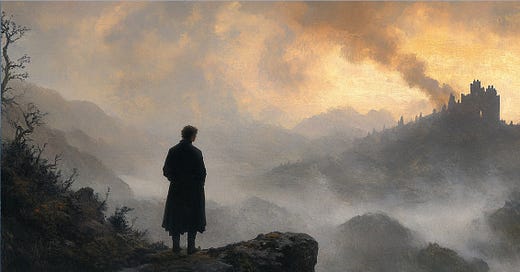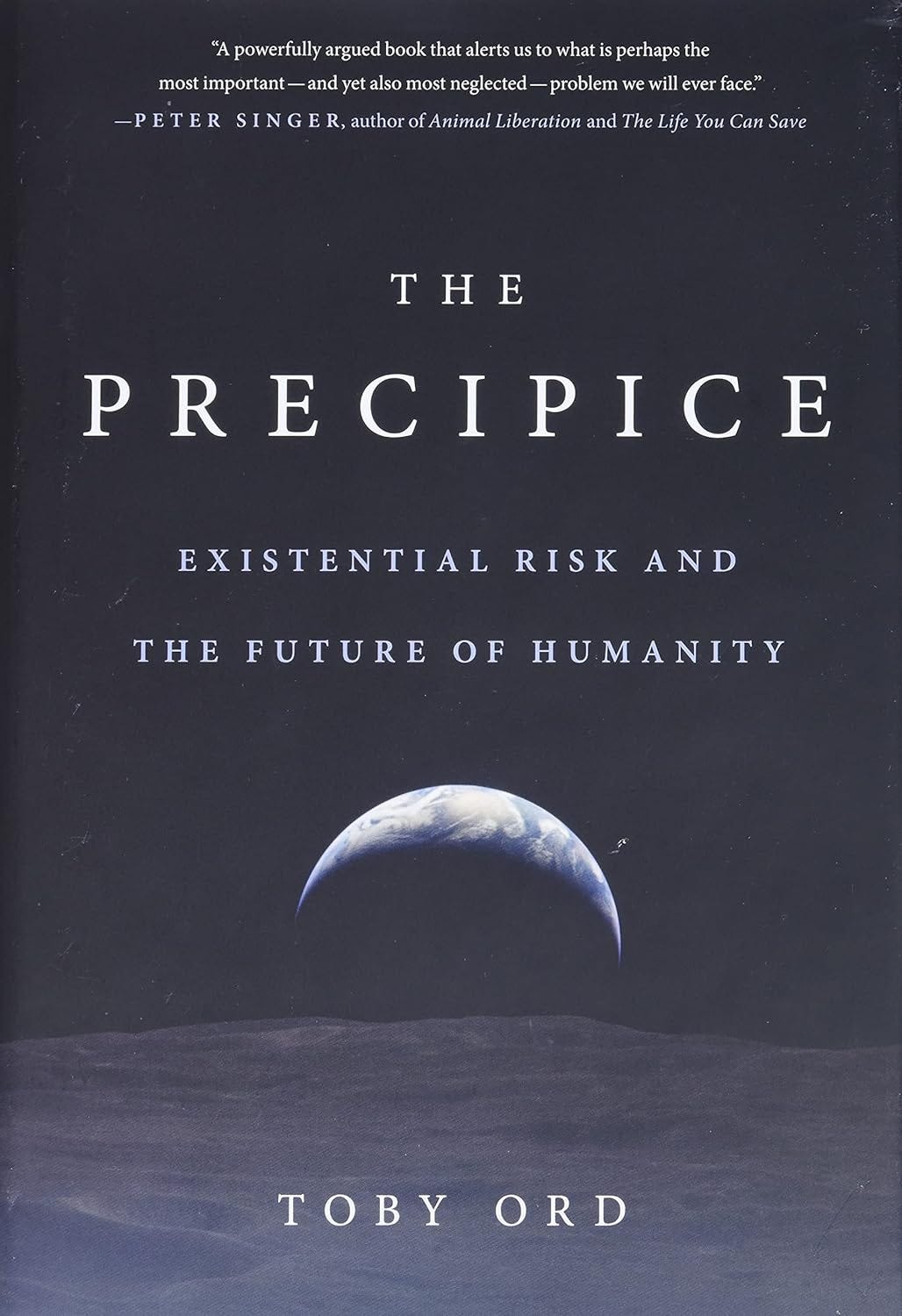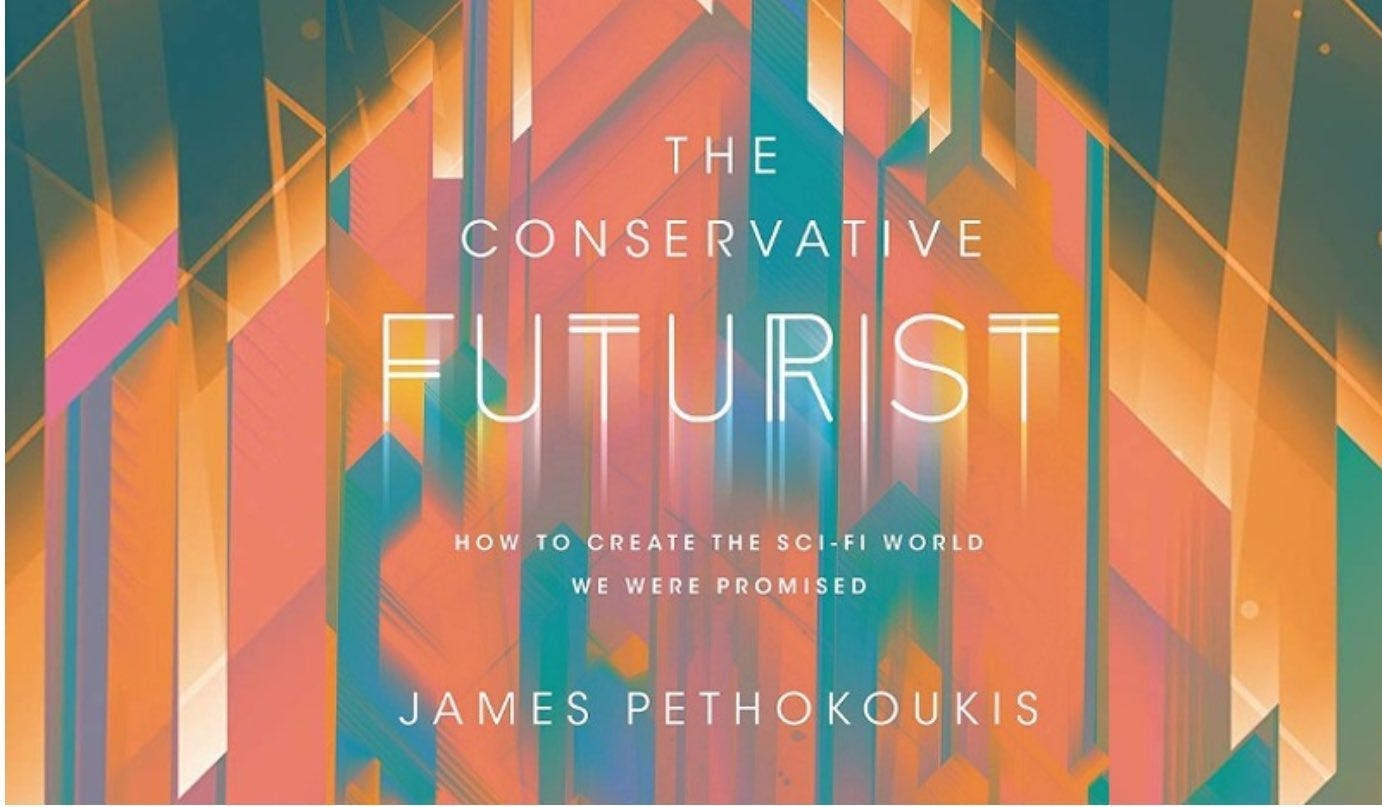The 2020s have so far been marked by pandemic, war, and startling technological breakthroughs. Conversations around climate disaster, great-power conflict, and malicious AI are seemingly everywhere. It’s enough to make anyone feel like the end might be near. Toby Ord has made it his mission to figure out just how close we are to catastrophe — and maybe not close at all!
Ord is the author of the 2020 book, The Precipice: Existential Risk and the Future of Humanity. Back then, I interviewed Ord on the American Enterprise Institute’s Political Economy podcast, and you can listen to that episode here. In 2024, he delivered his talk, The Precipice Revisited, in which he reassessed his outlook on the biggest threats facing humanity.
Today on Faster, Please — The Podcast, Ord and I address the lessons of Covid, our risk of nuclear war, potential pathways for AI, and much more.
Ord is a senior researcher at Oxford University. He has previously advised the UN, World Health Organization, World Economic Forum, and the office of the UK Prime Minister.
In This Episode
Climate change (1:30)
Nuclear energy (6:14)
Nuclear war (8:00)
Pandemic (10:19)
Killer AI (15:07)
Artificial General Intelligence (21:01)
Below is a lightly edited transcript of our conversation.
Climate change (1:30)
. . . the two worst pathways, we're pretty clearly not on, and so that's pretty good news that we're kind of headed more towards one of the better pathways in terms of the emissions that we'll put out there.
Pethokoukis: Let's just start out by taking a brief tour through the existential landscape and how you see it now versus when you first wrote the book The Precipice, which I've mentioned frequently in my writings. I love that book, love to see a sequel at some point, maybe one's in the works . . . but let's start with the existential risk, which has dominated many people's thinking for the past quarter-century, which is climate change.
My sense is, not just you, but many people are somewhat less worried than they were five years ago, 10 years ago. Perhaps they see at least the most extreme outcomes less likely. How do you see it?
Ord: I would agree with that. I'm not sure that everyone sees it that way, but there were two really big and good pieces of news on climate that were rarely reported in the media. One of them is that there's the question about how many emissions there'll be. We don't know how much carbon humanity will emit into the atmosphere before we get it under control, and there are these different emissions pathways, these RCP 4.5 and things like this you'll have heard of. And often, when people would give a sketch of how bad things could be, they would talk about RCP 8.5, which is the worst of these pathways, and we're very clearly not on that, and we're also, I think pretty clearly now, not on RCP 6, either. So the two worst pathways, we're pretty clearly not on, and so that's pretty good news that we're kind of headed more towards one of the better pathways in terms of the emissions that we'll put out there.
What are we doing right?
Ultimately, some of those pathways were based on business-as-usual ideas that there wouldn't be climate change as one of the biggest issues in the international political sphere over decades. So ultimately, nations have been switching over to renewables and low-carbon forms of power, which is good news. They could be doing it much more of it, but it's still good news. Back when we initially created these things, I think we would've been surprised and happy to find out that we were going to end up among the better two pathways instead of the worst ones.
The other big one is that, as well as how much we'll admit, there's the question of how bad is it to have a certain amount of carbon in the atmosphere? In particular, how much warming does it produce? And this is something of which there's been massive uncertainty. The general idea is that we're trying to predict, if we were to double the amount of carbon in the atmosphere compared to pre-industrial times, how many degrees of warming would there be? The best guess since the year I was born, 1979, has been three degrees of warming, but the uncertainty has been somewhere between one and a half degrees and four and a half.
Is that Celsius or Fahrenheit, by the way?
This is all Celsius. The climate community has kept the same uncertainty from 1979 all the way up to 2020, and it’s a wild level of uncertainty: Four and a half degrees of warming is three times one and a half degrees of warming, so the range is up to triple these levels of degrees of warming based on this amount of carbon. So massive uncertainty that hadn't changed over many decades.
Now they've actually revised that and have actually brought in the range of uncertainty. Now they're pretty sure that it's somewhere between two and a half and four degrees, and this is based on better understanding of climate feedbacks. This is good news if you're concerned about worst-case climate change. It's saying it's closer to the central estimate than we'd previously thought, whereas previously we thought that there was a pretty high chance that it could even be higher than four and a half degrees of warming.
When you hear these targets of one and a half degrees of warming or two degrees of warming, they sound quite precise, but in reality, we were just so uncertain of how much warming would follow from any particular amount of emissions that it was very hard to know. And that could mean that things are better than we'd thought, but it could also mean things could be much worse. And if you are concerned about existential risks from climate change, then those kind of tail events where it's much worse than we would've thought the things would really get, and we're now pretty sure that we're not on one of those extreme emissions pathways and also that we're not in a world where the temperature is extremely sensitive to those emissions.
Nuclear energy (6:14)
Ultimately, when it comes to the deaths caused by different power sources, coal . . . killed many more people than nuclear does — much, much more . . .
What do you make of this emerging nuclear power revival you're seeing across Europe, Asia, and in the United States? At least the United States it’s partially being driven by the need for more power for these AI data centers. How does it change your perception of risk in a world where many rich countries, or maybe even not-so-rich countries, start re-embracing nuclear energy?
In terms of the local risks with the power plants, so risks of meltdown or other types of harmful radiation leak, I'm not too concerned about that. Ultimately, when it comes to the deaths caused by different power sources, coal, even setting aside global warming, just through particulates being produced in the soot, killed many more people than nuclear does — much, much more, and so nuclear is a pretty safe form of energy production as it happens, contrary to popular perception. So I'm in favor of that. But the proliferation concerns, if it is countries that didn't already have nuclear power, then the possibility that they would be able to use that to start a weapons program would be concerning.
And as sort of a mechanism for more clean energy. Do you view nuclear as clean energy?
Yes, I think so. It's certainly not carbon-producing energy. I think that it has various downsides, including the difficulty of knowing exactly what to do with the fuel, that will be a very long lasting problem. But I think it's become clear that the problems caused by other forms of energy are much larger and we should switch to the thing that has fewer problems, rather than more problems.
Nuclear war (8:00)
I do think that the Ukraine war, in particular, has created a lot of possible flashpoints.
I recently finished a book called Nuclear War: A Scenario, which is kind of a minute-by-minute look at how a nuclear war could break out. If you read the book, the book is terrifying because it really goes into a lot of — and I live near Washington DC, so when it gives its various scenarios, certainly my house is included in the blast zone, so really a frightening book. But when it tried to explain how a war would start, I didn't find it a particularly compelling book. The scenarios for actually starting a conflict, I didn't think sounded particularly realistic.
Do you feel — and obviously we have Russia invade Ukraine and loose talk by Vladimir Putin about nuclear weapons — do you feel more or less confident that we'll avoid a nuclear war than you did when you wrote the book?
Much less confident, actually. I guess I should say, when I wrote the book, it came out in 2020, I finished the writing in 2019, and ultimately we were in a time of relatively low nuclear risk, and I feel that the risk has risen. That said, I was trying to provide estimates for the risk over the next hundred years, and so I wasn't assuming that the low-risk period would continue indefinitely, but it was quite a shock to end up so quickly back in this period of heightened tensions and threats of nuclear escalation, the type of thing I thought was really from my parents' generation. So yes, I do think that the Ukraine war, in particular, has created a lot of possible flashpoints. That said, the temperature has come down on the conversation in the last year, so that's something.
Of course, the conversation might heat right back up if we see a Chinese invasion of Taiwan. I've been very bullish about the US economy and world economy over the rest of this decade, but the exception is as long as we don't have a war with China, from an economic point of view, but certainly also a nuclear point of view. Two nuclear armed powers in conflict? That would not be an insignificant event from the existential-risk perspective.
It is good that China has a smaller nuclear arsenal than the US or Russia, but there could easily be a great tragedy.
Pandemic (10:19)
Overall, a lot of countries really just muddled through not very well, and the large institutions that were supposed to protect us from these things, like the CDC and the WHO, didn't do a great job either.
The book comes out during the pandemic. Did our response to the pandemic make you more or less confident in our ability and willingness to confront that kind of outbreak? The worst one that saw in a hundred years?
Yeah, overall, it made me much less confident. There'd been general thought by those who look at these large catastrophic risks that when the chips are down and the threat is imminent, that people will see it and will band together and put a lot of effort into it; that once you see the asteroid in your telescope and it's headed for you, then things will really get together — a bit like in the action movies or what have you.
That's where I take my cue from, exactly.
And with Covid, it was kind of staring us in the face. Those of us who followed these things closely were quite alarmed a long time before the national authorities were. Overall, a lot of countries really just muddled through not very well, and the large institutions that were supposed to protect us from these things, like the CDC and the WHO, didn't do a great job either. That said, scientists, particularly developing RNA vaccines, did better than I expected.
In the years leading up to the pandemic, certainly we'd seen other outbreaks, they’d had the avian flu outbreak, and you know as well as I do, there were . . . how many white papers or scenario-planning exercises for just this sort of event. I think I recall a story where, in 2018, Bill Gates had a conversation with President Trump during his first term about the risk of just such an outbreak. So it's not as if this thing came out of the blue. In many ways we saw the asteroid, it was just pretty far away. But to me, that says something again about as humans, our ability to deal with severe, but infrequent, risks.
And obviously, not having a true global, nasty outbreak in a hundred years, where should we focus our efforts? On preparation? Making sure we have enough ventilators? Or our ability to respond? Because it seems like the preparation route will only go so far, and the reason it wasn't a much worse outbreak is because we have a really strong ability to respond.
I'm not sure if it's the same across all risks as to how preparation versus ability to respond, which one is better. In some risks, there's also other possibilities like avoiding an outbreak, say, an accidental outbreak happening at all, or avoiding a nuclear war starting and not needing to actually respond at all. I'm not sure if there's an overall rule as to which one was better.
Do you have an opinion on the outbreak of Covid?
I don't know whether it was a lab leak. I think it's a very plausible hypothesis, but plausible doesn't mean it's proven.
And does the post-Covid reaction, at least in the United States, to vaccines, does that make you more or less confident in our ability to deal with . . . the kind of societal cohesion and confidence to tackle a big problem, to have enough trust? Maybe our leaders don't deserve that trust, but what do you make from this kind of pushback against vaccines and — at least in the United States — our medical authorities?
When Covid was first really striking Europe and America, it was generally thought that, while China was locking down the Wuhan area, that Western countries wouldn't be able to lock down, that it wasn't something that we could really do, but then various governments did order lockdowns. That said, if you look at the data on movement of citizens, it turns out that citizens stopped moving around prior to the lockdowns, so the lockdown announcements were more kind of like the tail, rather than the dog.
But over time, citizens wanted to kind of get back out and interact more, and the rules were preventing them, and if a large fraction of the citizens were under something like house arrest for the better part of a year, would that lead to some fairly extreme resentment and some backlash, some of which was fairly irrational? Yeah, that is actually exactly the kind of thing that you would expect. It was very difficult to get a whole lot of people to row together and take the same kind of response that we needed to coordinate the response to prevent the spread, and pushing for that had some of these bad consequences, which are also going to make it harder for next time. We haven't exactly learned the right lessons.
Killer AI (15:07)
If we make things that are smarter than us and are not inherently able to control their values or give them moral rules to work within, then we should expect them to ultimately be calling the shots.
We're more than halfway through our chat and now we're going to get to the topic probably most people would like to hear about: After the robots take our jobs, are they going to kill us? What do you think? What is your concern about AI risk?
I'm quite concerned about it. Ultimately, when I wrote my book, I put AI risk as the biggest existential risk, albeit the most uncertain, as well, and I would still say that. That said, some things have gotten better since then.
I would assume what makes you less confident is one, what seems to be the rapid advance — not just the rapid advance of the technology, but you have the two leading countries in a geopolitical globalization also being the leaders in the technology and not wanting to slow it down. I would imagine that would make you more worried that we will move too quickly. What would make you more confident that we would avoid any serious existential downsides?
I agree with your supposition that the attempts by the US and China to turn this into some kind of arms race are quite concerning. But here are a few things: Back when I was writing the book, the leading AI systems with things like AlphaGo, if you remember that, or the Atari plane systems.
Quaint. Quite quaint.
It was very zero-sum, reinforcement-learning-based game playing, where these systems were learning directly to behave adversarially to other systems, and they could only understand the kind of limited aspect about the world, and struggle, and overcoming your adversary. That was really all they could do, and the idea of teaching them about ethics, or how to treat people, and the diversity of human values seemed almost impossible: How do you tell a chess program about that?
But then what we've ended up with is systems that are not inherently agents, they're not inherently trying to maximize something. Rather, you ask them questions and they blurt out some answers. These systems have read more books on ethics and moral philosophy than I have, and they've read all kinds of books about the human condition. Almost all novels that have ever been published, and pretty much every page of every novel involves people judging the actions of other people and having some kind of opinions about them, and so there's a huge amount of data about human values, and how we think about each other, and what's inappropriate behavior. And if you ask the systems about these things, they're pretty good at judging whether something's inappropriate behavior, if you describe it.
The real challenge remaining is to get them to care about that, but at least the knowledge is in the system, and that's something that previously seemed extremely difficult to do. Also, these systems, there are versions that do reasoning and that spend longer with a private text stream where they think — it's kind of like sub-vocalizing thoughts to themselves before they answer. When they do that, these systems are thinking in plain English, and that's something that we really didn't expect. If you look at all of the weights of a neural network, it's quite inscrutable, famously difficult to know what it's doing, but somehow we've ended up with systems that are actually thinking in English and where that could be inspected by some oversight process. There are a number of ways in which things are better than I’d feared.
So what is your actual existential risk scenario look like? This is what you're most concerned about happening with AI.
I think it's quite hard to be all that concrete on it at the moment, partly because things change so quickly. I don't think that there's going to be some kind of existential catastrophe from AI in the next couple of years, partly because the current systems require so much compute in order to run them that they can only be run at very specialized and large places, of which there's only a few in the world. So that means the possibility that they break out and copy themselves into other systems is not really there, in which case, the possibility of turning them off is much possible as well.
Also, they're not yet intelligent enough to be able to execute a lengthy plan. If you have some kind of complex task for them, that requires, say, 10 steps — for example, booking a flight on the internet by clicking through all of the appropriate pages, and finding out when the times are, and managing to book your ticket, and fill in the special codes they sent to your email, and things like that. That's a somewhat laborious task and the systems can't do things like that yet. There's still the case that, even if they've got a, say, 90 percent chance of completing any particular step, that the 10 percent chances of failure add up, and eventually it's likely to fail somewhere along the line and not be able to recover. They'll probably get better at that, but at the moment, the inability to actually execute any complex plans does provide some safety.
Ultimately, the concern is that, at a more abstract level, we're building systems which are smarter than us at many things, and we're attempting to make them much more general and to be smarter than us across the board. If you know that one player is a better chess player than another, suppose Magnus Carlsen's playing me at chess, I can't predict exactly how he's going to beat me, but I can know with quite high likelihood that he will end up beating me. I'll end up in checkmate, even though I don't know what moves will happen in between here and there, and I think that it's similar with AI systems. If we make things that are smarter than us and are not inherently able to control their values or give them moral rules to work within, then we should expect them to ultimately be calling the shots.
Artificial General Intelligence (21:01)
Ultimately, existential risks are global public goods problems.
I frequently check out the Metaculus online prediction platform, and I think currently on that platform, 2027 for what they would call “weak AGI,” artificial general intelligence — a date which has moved up two months in the past week as we're recording this, and then I think 2031 also has accelerated for “strong AGI,” so this is pretty soon, 2027 or 2031, quite soon. Is that kind of what you're assuming is going to happen, that we're going to have to deal with very powerful technologies quite quickly?
Yeah, I think that those are good numbers for the typical case, what you should be expecting. I think that a lot of people wouldn't be shocked if it turns out that there is some kind of obstacle that slows down progress and takes longer before it gets overcome, but it's also wouldn't be surprising at this point if there are no more big obstacles and it's just a matter of scaling things up and doing fairly simple processes to get it to work.
It’s now a multi-billion dollar industry, so there's a lot of money focused on ironing out any kinks or overcoming any obstacles on the way. So I expect it to move pretty quickly and those timelines sound very realistic. Maybe even sooner.
When you wrote the book, what did you put as the risk to human existence over the next a hundred years, and what is it now?
When I wrote the book, I thought it was about one in six.
So it's still one in six . . . ?
Yeah, I think that's still about right, and I would say that most of that is coming from AI.
This isn't, I guess, a specific risk, but, to the extent that being positive about our future means also being positive on our ability to work together, countries working together, what do you make of society going in the other direction where we seem more suspicious of other countries, or more even — in the United States — more suspicious of our allies, more suspicious of international agreements, whether they're trade or military alliances. To me, I would think that the Age of Globalization would've, on net, lowered that risk to one in six, and if we're going to have less globalization, to me, that would tend to increase that risk.
That could be right. Certainly increased suspicion, to the point of paranoia or cynicism about other nations and their ability to form deals on these things, is not going to be helpful at all. Ultimately, existential risks are global public goods problems. This continued functioning of human civilization is this global public good and existential risk is the opposite. And so these are things where, one way to look at it is that the US has about four percent of the world's people, so one in 25 people live in the US, and so an existential risk is hitting 25 times as many people as. So if every country is just interested in themself, they'll undervalue it by a factor of 25 or so, and the countries need to work together in order to overcome that kind of problem. Ultimately, if one of us falls victim to these risks, then we all do, and so it definitely does call out for international cooperation. And I think that it has a strong basis for international cooperation. It is in all of our interests. There are also verification possibilities and so on, and I'm actually quite optimistic about treaties and other ways to move forward.
On sale everywhere The Conservative Futurist: How To Create the Sci-Fi World We Were Promised
Micro Reads
▶ Economics
Tech tycoons have got the economics of AI wrong - Economist
▶ Business
DeepSeek Calls for Deep Breaths From Big Tech Over Earnings - Bberg Opinion
▶ Policy/Politics
FDA Deregulation of E-Cigarettes Saved Lives and Spurred Innovation - Marginal Revolution
▶ AI/Digital
▶ Biotech/Health
▶ Clean Energy/Climate
Another Boffo Energy Forecast, Just in Time for DeepSeek - Heatmap News
▶ Robotics/AVs
AIs and Robots Should Sound Robotic - IEEE Spectrum
Robot beauticians touch down in California - FT Opinion
▶ Space/Transportation
▶ Up Wing/Down Wing
▶ Substacks/Newsletters
I spent two days testing DeepSeek R1 - Understanding AI
The state of decarbonization in five charts - Exponential View
The mistake of the century - Slow Boring
The Child Penalty: An International View - Conversable Economist
Deep Deepseek History and Impact on the Future of AI - next BIG future
















Share this post